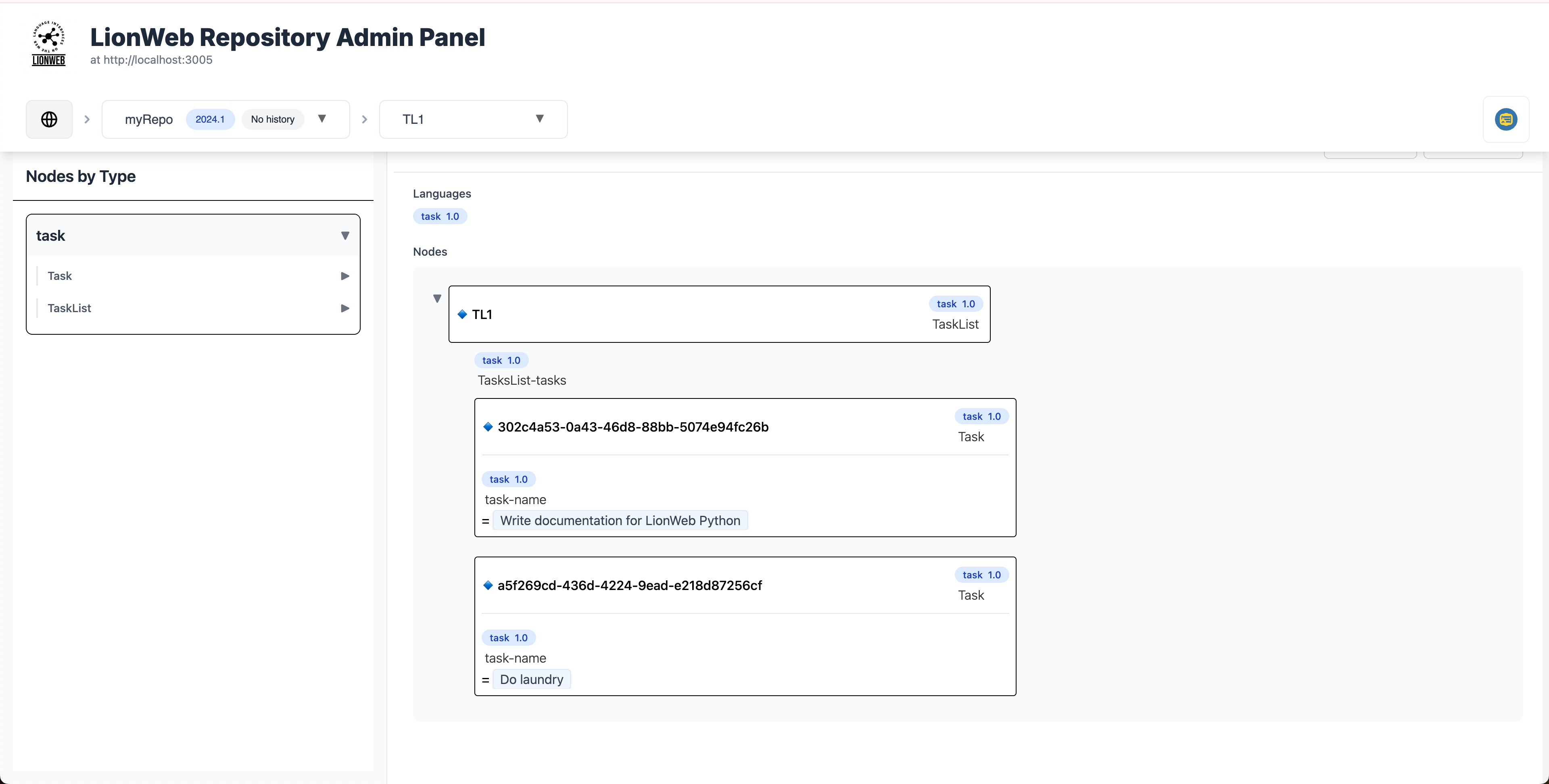Working with the LionWeb Repository
Working with the LionWeb Repository we can store and retrieve nodes. It is also a mean to exchange models with other LionWeb-compliant components. You can refer to the website of the LionWeb Repository to learn how to start it.
This page provides an overview of how to interact with the repository using the provided Python client and outlines the basic concepts involved.
Overview
The LionWeb Repository is a generic storage system designed to hold nodes conforming to the LionWeb metamodel.
It provides two sets of APIs:
- The Bulk APIs: intended to store and retrieve entire partitions or large sub-trees
- The Delta APIs: currently under development, it will support real-time collaboration
The LionWeb Repository can also optionally support versioning.
In this guide we will only focus on the Bulk APIs.
Working with the Bulk APIs
It offers REST APIs for communication, which are wrapped in a convenient Python client: RepoClient. This client supports features like:
- Creating and managing partitions (top-level model containers)
- Storing and retrieving nodes
- Supporting multiple LionWeb versions
Example Usage
The following example demonstrates how to use the LionWeb Java client to:
- Connect to a running LionWeb Repository
- Define a language and register it
- Create a partition node
- Add children to that partition
- Store and retrieve nodes
import uuid
from typing import Optional, List
from lionweb import LionWebVersion
from lionweb.language import Concept, Property, LionCoreBuiltins, Containment, Language
from lionweb.repoclient import RepoClient
from lionweb.model import DynamicNode
from lionweb.repoclient.repo_client import RepositoryConfiguration
from lionweb.utils import root
# Global elements
task_list_concept: Concept
task_concept: Concept
name_property: Property
tasks_containment: Containment
task_language: Language
def define_language():
global task_list_concept, task_concept, name_property, tasks_containment, task_language
# Define the 'TaskList' concept
task_list_concept = Concept(
name="TaskList", key="TaskList", id="TaskList-id", abstract=False, partition=True
)
# Define the 'Task' concept
task_concept = Concept(
name="Task", key="Task", id="Task-id", abstract=False, partition=False
)
# Add a 'tasks' containment
tasks_containment = Containment(
name="tasks",
key="TasksList-tasks",
id="TasksList-tasks-id",
type=task_concept,
multiple=True,
optional=False,
)
task_list_concept.add_feature(tasks_containment)
# Add a 'name' property
name_property = Property(
name="name", key="task-name", id="task-name-id", type=LionCoreBuiltins.get_string()
)
task_concept.add_feature(name_property)
# Define the language container
task_language = Language(
name="Task Language",
key="task",
id="task-id",
version="1.0"
)
task_language.add_element(task_list_concept)
task_language.add_element(task_concept)
# === Define specific DynamicNode subclasses ===
class Task(DynamicNode):
def __init__(self, name: str, id: Optional[str] = None):
super().__init__(id or str(uuid.uuid4()), task_concept)
self.set_name(name)
def set_name(self, name: str):
self.set_property_value(name_property, name)
def get_name(self) -> str:
return self.get_property_value(name_property)
class TaskList(DynamicNode):
def __init__(self, id:Optional[str] = None):
super().__init__(id or str(uuid.uuid4()), task_list_concept)
def add_task(self, task: Task):
self.add_child(tasks_containment, task)
def get_tasks(self) -> List[Task]:
return self.get_children(tasks_containment)
def repo_example():
# Create the client
client = RepoClient(lionweb_version=LionWebVersion.V2024_1, repo_url="http://localhost:3005", repository_name="myRepo")
client.create_repository(RepositoryConfiguration(name='myRepo', lionweb_version=LionWebVersion.V2024_1, history=False))
# Register the language
client.serialization().register_language(task_language)
def task_list_deserializer(classifier, sci, nodes_by_id, property_values) -> TaskList:
return TaskList(id=sci.id)
def task_deserializer(classifier, sci, nodes_by_id, property_values) -> Task:
return Task(id=sci.id, name=property_values[name_property])
client.serialization().instantiator.register_custom_deserializer(task_list_concept.id, task_list_deserializer)
client.serialization().instantiator.register_custom_deserializer(task_concept.id, task_deserializer)
# Create a partition node
tl1 = TaskList(id="TL1")
# Create the partition on the server
client.create_partition(tl1)
# Create two files
t1 = Task(name="Do laundry")
t2 = Task(name="Write documentation for LionWeb Python")
# Add them to the partition
tl1.add_task(t1)
tl1.add_task(t2)
# Store the model in the repository
client.store([tl1])
# Retrieve and check
retrieved_nodes = client.retrieve(["TL1"])
assert len(retrieved_nodes) == 3
retrieved_tl1 = root(retrieved_nodes)
assert retrieved_tl1.id == 'TL1'
if __name__ == "__main__":
define_language()
repo_example()
And this is how the result would look like in the LionWeb Repo Admin UI:

Creating partitions
Something to keep in mind is that the LionWeb Repository will only let us create partitions without children. So, we may need to create a partition and only then add children to it by invoking store.